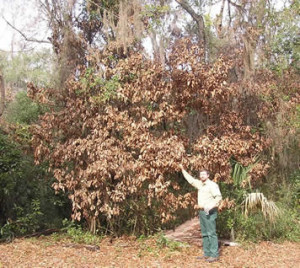
Laurel wilt is a deadly vascular disease of plants in the Laurel family (Lauraceae). It is caused by the fungus Harringtonia lauricola and vectored by the redbay ambrosia beetle, Xyleborus glabratus, apparently introduced from Asia in solid wood packing material into the Port of Savannah.

Since 2003, laurel wilt has caused massive mortality in most species of the Lauraceae within the southeast United States. Redbay (Persea borbonia) trees in the coastal plains of South Carolina and Georgia were the first casualties of laurel wilt in 2004 with Florida following closely behind in 2005. This nonnative invasive insect/disease complex quickly spread across eleven Southern States (Mississippi 2009, Alabama 2011, North Carolina 2011, Arkansas 2015, Louisiana 2014, Texas 2015, Kentucky and Tennessee in 2019).
Other native forest species susceptible to the disease include redbay (Persea borbonia), swampbay (Persea palustris – often considered synonymous with redbay), sassafras (Sassafras albidum), pondspice (Litsea aestivalis), pondberry (Lindera melissifolia – federally endangered), silk bay (Persea humilis), bay Laurel (Lourus nobilis), and camphortree (Cinnamomum camphora.)
This insect/disease infestation complex is projected to continue spreading across the United States. To date, there is no biocontrol or insecticidal control, and only the cultural practice of not moving infested material will possibly slow the spread.
Avocado (Persea americana) also is susceptible to laurel wilt disease, which has devastated the commercial production area in south Florida.
- 2023 Laurel Wilt Disease Map
- Distribution and Spread of Laurel Wilt Disease in Georgia (2006-08)
- Evaluation of Laurel Wilt Disease in Georgia- Progression in Redbay and Sassafras (2008-2010)
- Laurel Wilt Disease FAQs
- Laurel Wilt Disease History in Georgia
- Laurel Wilt Progression Map
- Laurel Wilt USFS Pest Alert (2019)
- Redbay Laurel Wilt Recovery Plan (2015)
We are happy to assist with any questions or concerns you may have. If you can’t find something you are looking for, please let us know, and we will be glad to help.
